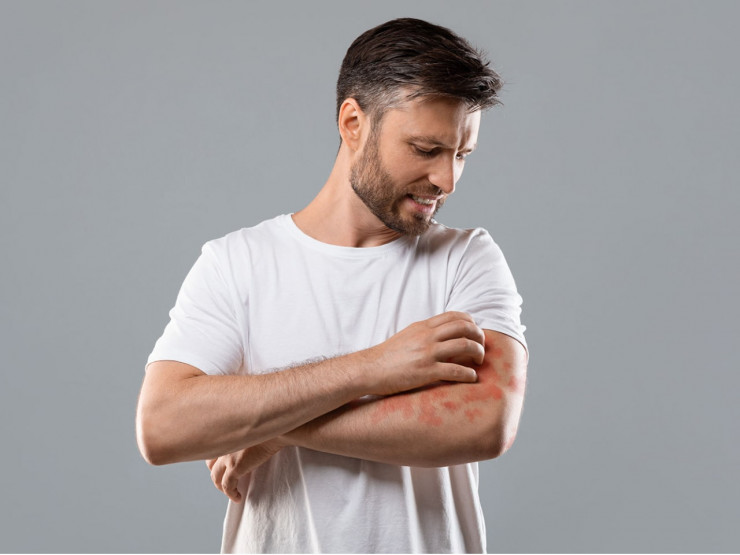Struggling with dry, flaky, itchy skin?
Perhaps your child’s eczema has flared up? Or you’re suffering from cracked, painful skin due to the harsh weather conditions?
There’s light at the end of the tunnel!
By combining dermatologist recommendations, tips from our experienced team here at Whitworth Pharmacy and powerful self-care lifestyle advice, you can ease your dry skin condition and feel like your gorgeous self again.
Keep reading to discover exactly what causes dry skin, the best skincare regimes, whether holistic treatments work (and which ones you might like to try) and how to take care of the little ones’ skin too.
What is dry skin?
If you have dry skin, you’ll know just how uncomfortable and irritating it can be. This common skin condition can hit us at any time and whatever your usual skin type. Even people with oily or mixed complexions can suffer from dry patches from time to time.
It happens when your skin loses moisture, leading to those symptoms of dryness, itching, scaling, flaking and more.
Your skin is a barrier that protects your body from injury, UV light, pathogens and chemical damage as well as helping to regulate your body temperature. It’s one of the biggest organs of our body and is made of three layers: the epidermis, dermis, and hypodermis. The epidermis is the outer layer and is where your dry skin problem originates from.
Ideally, your skin moisture levels should be over 10%, or ideally between 20-35% for plump, healthy skin. If the moisture levels drop, you’re more likely to suffer from the usual symptoms of dry skin.
What are the symptoms of dry skin?
The symptoms of dry skin can include the following:
● Itching
● Tightness, especially after the skin has been in contact with water
● Fine lines and wrinkles
● Cracks that bleed or become inflamed
● Grey-looking skin, particularly with darker skin tones
● Rough skin that feels like sandpaper
● Redness and irritation
● Flaky, peeling or scaly skin
● Skin infections
Although we most often focus on dry skin on the face and hands, it can appear on other parts of the body such as our stomach and legs.
The good news is, you can treat your dry skin by tweaking your lifestyle habits, using the correct skin care products for your skin and speaking to your GP if you cannot resolve the problem with over-the-counter products.
What causes dry skin?
Dry skin can be caused by a range of factors that could include:
● Excessive showering or bathing: Too much time spent in the bathroom can strip the body of its natural protection, especially if you prefer to use very hot water. Baths are the worst of the culprits due to the long time we tend to spend soaking.
● A dry environment: Central heating, fans or hot water can dry out our skin and lead to uncomfortable symptoms.
● Using harsh skincare products: It can be tempting to use harsh skincare products if you have acne, blemish-prone or oily skin. However, these can strip away your natural oil, increase irritation and make the problem worse.
● Frequent exposure to wind and sun: This evaporates water from the skin and can lead to premature ageing and skin dryness.
● Not drinking enough water: Skin hydration starts from the inside. Make sure you’re drinking plenty.
● Lack of sleep: Sleep helps the body heal, rejuvenate and regulate itself. If your body is struggling to get what it needs, your skin will suffer.
● A vitamin or mineral deficiency: Your body needs a balance of nutrients to help it stay healthy. Deficiencies in vitamins D, niacin, zinc or iron can cause many symptoms. This can be caused by picky eating habits, absorption problems and anorexia.
● The ageing process: After the age of 40, our skin produces less sebum- the waxy substance that helps keep our skin moist and supple.
● Certain medications: Dry skin is a well-known side effect of taking many medications. Check any labels and speak to your GP or pharmacist for advice.
● A low temperature outside: Cold air holds less moisture which can dry out your skin.
● Smoking: This can speed up the rate at which your skin ages. Speak to your pharmacist about our Stop Smoking service.
● Certain skin conditions: Dermatitis, psoriasis and ichthyosis can cause dry skin.
● Cancer treatment (current and past): Chemotherapy, targeted therapy and radiation treatments can also affect your skin.
● Diabetes, thyroid disease, kidney disease or an HIV positive diagnosis: These conditions can cause dry skin.
● Kidney dialysis: If you are undergoing kidney dialysis, you will have less water in your body which can trigger skin problems.
● Your job: Are you a hairdresser, cook, florist, nurse, housekeeper or constantly need to put your hands in water or use chemicals? This too can lead to skin problems.
What are the best daily skincare regimes for dry skin?
When you have dry skin, you’ll need to set up a gentle, soothing daily skincare regime so that you can nourish your skin, keep it supple and lock moisture in place. Here is what we suggest:
1. Start with a gentle cleanser
Skip the soap or harsh products and instead choose a non-scented, gentle face wash or soap that will remove makeup, dirt, grime and other pollutants effectively. We love E45 Wash Cream, Aveeno Dermexa Wash and MooGoo Goats Milk Soap to name just a few.
Avoid excessive washing, use lukewarm water (not hot!) and ensure the cleansing product is removed from your skin.
2. Use a toner
If you’re cleansing your face, consider using a gentle, soothing toner. This will remove any last traces of dirt or makeup and help prime your skin ready for moisturising.
3. Hydrate (optional)
Extremely dry skin needs extra TLC to heal. If this sounds like you, we suggest you use a face oil such as Bio-Oil Dry Skin Gel because it’s nourishing, easily absorbed and non-comedogenic. This optional extra step helps plump up your skin and reduce dryness before you apply your regular moisturiser.
4. Moisturise
Next use a moisturiser to hydrate your skin, soothe your symptoms and leave you with a fresher appearance. The following products are ideal for skin like yours:
● Oilatum Eczema and Dry Skin Emollient Cream
Lightly massage into your skin using circular movements and then leave to absorb for a minute or two.
For best effect, consider using a night cream such as MooGoo Night Cream or Blossom Night Cream that will help nourish your skin whilst you get those 8 hours of beauty sleep.
What are the most effective conventional treatments?
The best treatment for your dry skin will depend on its root cause and severity. For some, the occasional patch of dryness can be resolved by daily use of a good quality moisturiser.
Those with more severe symptoms or conditions may find the following beneficial:
● Avoid the trigger. Most of us are aware of those things that worsen or trigger our dry skin so we can make lifestyle changes such as avoiding hot water, drying environment and dietary triggers. If not, it’s worth keeping a diary to understand when your skin is becoming worse so you can take action.
● Moisturise. Whether you have small patches of dry skin or a condition such as eczema, it’s important to moisturise regularly. This will help trap moisture in your skin and help it to heal.
Dermatologists love the following products:
- Aveeno Dermexa Fast and Long Lasting Balm,
- E45 cream/ E45 Shower Gel / E45 Itch Relief Cream / E45 Bath,
- Oilatum Emollient Light Liquid Paraffin For Eczema & Itchy Skin,
- Eurax Cream 100g
If you suffer from blemishes, look for a non-comedogenic moisturiser designed for your skin type such as Bio-Oil Dry Skin Gel.
● Ditch scented products and soap. These can be too drying for sensitive skins so switch to an emollient to wash instead. Simple pop around a teaspoon in your hand, mix with warm water then use as normal.
● Visit your doctor. If you aren’t seeing an improvement in your symptoms or you are concerned, make an appointment to see your GP. They can often prescribe you a topical corticosteroid (cream or ointment to apply to skin) or oral corticosteroids to reduce inflammation and other products that might help. If required you could be referred to a dermatologist who may prescribe light therapy, immunosuppressant medication or other therapies that might help.
Remember that you can also pop into your local Whitworth Pharmacy for further advice from one of our friendly pharmacists.
Do holistic treatments help dry skin?
There are many holistic treatments and natural remedies that can help ease your symptoms and help you feel better. Many can help reduce bacteria, soothe inflammation and moisturise dry or broken skin.
Whilst they’re unlikely to cure your problem completely, they can be useful to add to your self-care toolkit so you can get better faster.
Our top picks include:
● Coconut oil: this natural oil contains fatty acids that moisturise and soothe the skin, and microbial properties so it can help kill bacteria and ease eczema and other dry skin conditions. Buy here.
● Tea tree oil. Although this healing oil is usually recommended for bug bites and acne, it can also be extremely soothing for itchy dry skin, prevent infections, reduce inflammation and relieve dryness. Always dilute before using a neat oil on the skin. Buy here.
● Diet & lifestyle changes. Certain foods can help reduce the inflammation in your body and ease flare-ups. This includes fish, leafy greens, beans and lentils, fruits and veggies and spices such as cinnamon and turmeric. It’s also worth getting plenty of sleep, avoiding those environmental triggers and quitting smoking.
Many sufferers of conditions such as eczema and dermatitis also find that following an elimination diet free from potential triggers such as dairy, eggs, soya and wheat can help.
Tips for children and babies with dry skin
Babies and children commonly experience dry skin and it’s usually nothing to worry about. However, you should always speak to your friendly pharmacist or a doctor if you are worried or need further guidance.
Here are some of our top tips:
Avoid bathing them too often. Usually, babies and children only need to have a bath once or twice per week. Keep the baths short- less than 10 minutes is ideal.
Use fragrance-free and alcohol-free wipes. Many contain ingredients that can irritate sensitive skin and make the problem worse.
Use baby shampoos and washes for children with eczema. These are gentle on sensitive skin and can soothe and treat dryness. Oilatum Junior Bath Additive is an excellent product you might like to consider trying.
Avoid rubbing with a towel. Gently pat your child dry after bathing and apply a good moisturiser.
Use gentle baby shampoos. Choose a gentle, moisturising baby shampoo that can cleanse and soothe or choose one specially designed for eczema.
Use mittens. This can prevent infants and young children from scratching.
Keep them cool. Avoid dressing a baby or child too warmly as sweat can worsen dry skin problems such as eczema.
Use fragrance-free laundry detergent. Again, the ingredients they contain can trigger or worsen skin problems.
Consider investing in a humidifier. Adding moisture to your environment can help. If you’re on a limited budget, placing a bowl of water on your radiator can also help.
How to protect your skin from the sun
Sunshine exposure can be a mixed bag for those with dry skin. Those with eczema can find that UV light and topping up their vitamin D levels can help. However, too much can sometimes make matters worse.
The best approach is to be careful, exposing your skin to small amounts of sunshine and monitoring how it reacts. You should also take the following steps:
● Stay cool in warm weather by using a fan or air conditioning.
● Stay in the shade on sunny days.
● Change clothes if you sweat.
● Cover up with sunglasses and a hat.
● Opt for breathable cotton clothing.
● Stay hydrated.
● Use sunscreen.
Summary
Follow the tips and product recommendations we’ve included here and you should soon get relief from your dry skin condition. However, if you have any questions or are worried, pop into your local Whitworth Pharmacy or visit your GP.
We’re always here to help.



